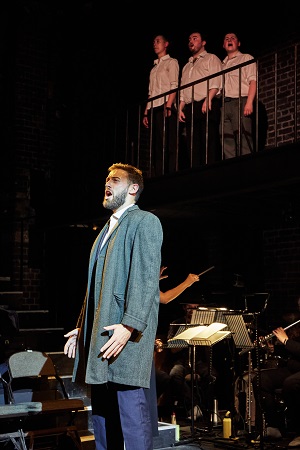Ned Rorem described works such as Leonard Bernstein’s Trouble in Tahiti (1952) as ‘Broadway operas’: a fusion of opera, music theatre and tv sitcom. There’s obviously a lot of edgy potential in such genre-bending hybridity. And Bernstein – think the 1971 Mass, as much as West Side Story – was always inclined to ditch labels and cross boundaries; so, one would think that the Grimeborn festival at the Arcola Theatre would be perfectly placed to exploit this restless crossover-creativity.
Yet, shifting audiences from their comfort zones is never an easy task. And, the industrial brickwork of Studio 1 at the Arcola doesn’t offer a natural backdrop for Bernstein’s post-WW2 critique of gender roles, consumerism and picture-perfect suburban 1950s America. Director Finn Lacey spreads a red-and-white checked gingham cloth on the breakfast table, but that’s about all that, visually, hints at suburban aspirations.
Trouble in Tahiti presents a day in the stultifying lives of Sam and Dinah, whose dawn chorus includes bickering about the burning of the breakfast coffee. She accuses him of having an affair with his secretary and visits her therapist; he works out his worries, and financial triumphs, at the gym. They have a son, Junior, but fail to show up to his school play. She goes to the movies and sees part of a second-rate film, Trouble in Tahiti. Later, Dinah and Sam return to see the same movie: it’s a symbol of the emptiness that is engulfing them.

Lacey did make the difficulties that the married couple have in communicating painfully evident. And, their different priorities played out as physical symptoms of incompatibility. There’s a ‘Greek Chorus’, too, to comment on the ‘non-action’, and at the Arcola Izzi Blain, James Wells and Tim Burton were a brilliantly breezy barbershop ‘scat trio’ – I half-expected Julie Andrews to appear at some point as they crooned cheerily and cheese-ily, even as the drama descended into David Lynch-like dysfunctionality.
But, I felt that Lacey needed to make the set pieces work harder. Dinah (named after Bernstein’s maternal grandmother) visits her psychotherapist, and her ‘Island Magic’ takes place in a hat shop; Sam (named after his father) launches into his big aria, ‘There’s a Law about Men’, in a gym locker room-cum-shower.
Alexandra Meier used oodles of nuance to convey Dinah’s seething resentment – social and sexual. She also made Dinah’s upbeat response to the movie an oasis of joy amid the squabbles; and her pulsating mezzo made a persuasive case for her dream that “[w]here love will teach us harmony and grace,/ Then love will lead us to a quiet place”. Peter Norris worked hard to present Sam’s alpha-male entitlement, but was occasionally a little unsteady as he pumped out his privilege.
I wonder if works such as Trouble in Tahiti need a technical leg-up to really come off these days? That said, Lacey might have made more of the opportunities for cinematic cross-cutting that the venue does afford.
Conductor Olivia Tait kept a taut rein on her seven-piece band and the show was ship-shape (though, perhaps, her musicians might have been allowed to run loose at times).
Trouble in Tahiti may be a work of its time, but it surely speaks, with wit and poignancy, of human concerns that have no clock ticking. Love is not locked into prosperity. Possessions don’t mean an end to emptiness. Idylls can be a dead end. Time magazine said, of the premiere, that the opera is ‘a little too real to be funny’ – a sentiment that seemed all too relevant at the Arcola.
Claire Seymour
Sam – Peter Norris, Dinah – Alexandra Meier, Trio – Izzi Blain, James Wells and Tim Burton; Director – Finn Lacey, Conductor – Olivia Tait, Lighting Design – Beri Valentine
Arcola Theatre, Dalston, London; Thursday 10th August 2023.
ABOVE: Trouble in Tahiti (Tim Burton, Izzi Blain, Alexandra Meier & James Wells) (c) Caz Dyer